Iranian Judiciary Staff On Nationwide Strike To Protest Low Salaries
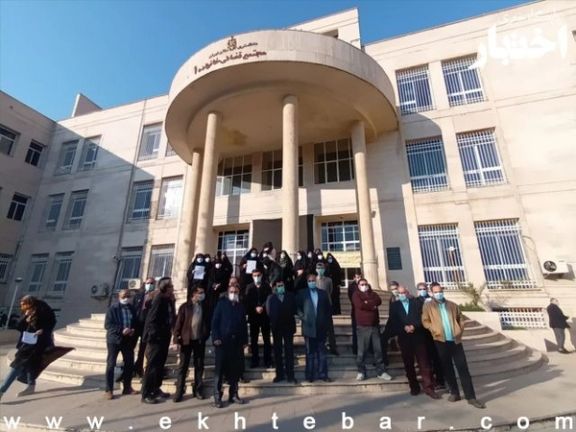
Hundreds of staff members from Iran’s judiciary department took to the streets in several cities across the country to protest their low salaries.

Hundreds of staff members from Iran’s judiciary department took to the streets in several cities across the country to protest their low salaries.
Videos published on social media on Saturday show groups of workers on strike and protesting in front of the provincial offices and departments of the Judiciary in several cities.
Quite ironically, the protesters are chanting slogans asking for justice.
There are also reports of strikes by judicial staff and judges in capital Tehran that is expected to last about a week.
In some cities, the employees of the Judiciary have started to resign from their jobs en masse, with photos of their collective resignation letterscirculating in twitter.
The nationwide protests were triggered following the rejection of a special plan to increase salaries for the judiciary staff by the parliament a few days ago.
People with different professions are holding regular protest rallies to demand better work conditions and salaries with teachers holding the largest number of demonstrations.
Food prices have risen by more than 60 percent this year, on top of high inflation in the previous three years. Government figures show that prices for 83 percent of basic food staples have reached a critical level. People living on salaries have cut back on consumption of nutritious food, such as meat, fruits and dairy products.
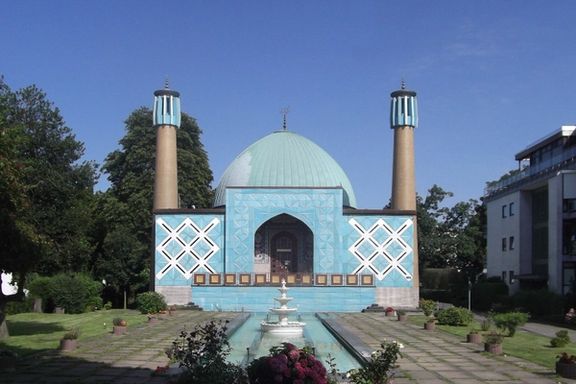
An Islamic organization in Germany has removed the Hamburg Islamic Center from its board of directors for supporting Qasem Soleimani and allegations that the center is Iran’s “long terrorist arm” in Europe.
The Hamburg Shura Council, an association of Muslim organizations that represents around 40 mosque communities and other Islamic institutions in the city, made the move after German intelligence sources confirmed connections to Iran’s leader Ali Khamenei as well as Hezbollah that are both designated as terrorist entities by the US and EU.
According to a report by German daily Die Welt, the new head of the Shura executive board, Fatih Yildiz, said their board of directors was restructured in November and the Hamburg Islamic Center is no longer represented. However, the center, known by its German abbreviation IZH for Islamische Zentrum Hamburg and its Blue Mosque are not completely expelled from the Shura Council.
According to a 2021 report by Philipp Wolden, the managing editor of Die Welt Hamburg, the IZH is Iran’s most “important propaganda center" in Europe, and it sends busloads of pro-Iranian and pro-Hezbollah activists to Berlin to participate in the annual al-Quds rallies.
In July, the German Office for the Protection of the Constitution also found evidence that the head of the IZH, Mohammad Hadi Mofatteh, is himself a member of the Revolutionary Guards.
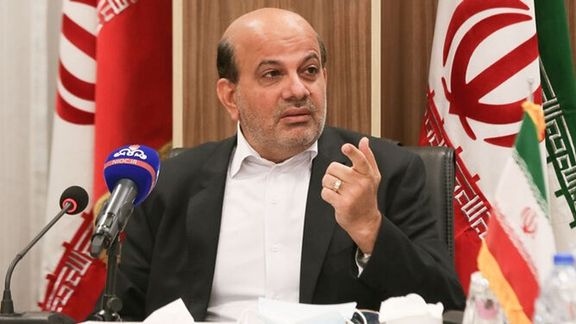
The CEO of Iran’s national oil company has said that oil exports have been increasing in recent months and Tehran has been able to repatriate the cash, despite sanctions.
Mohsen Khojastehmehr told Fars news website affiliated with Iran’s Revolutionary Guards that the government is trying to boost production to the pre-sanction levels until March, as stockpiles of exportable oil bi-products are dwindling.
Iran was producing 3.8 million barrels a day before the United States pulled out of the 2015 nuclear agreement (JCPOA) in May 2018 and imposed sanctions on Iran’s oil exports. For a while Iran continued to produce more as its exports declined from 2.1 million barrels per day to around 200,000 in 2019 and excess inventories began building up by early 2020 and production had to be cut back.
Khojastemehr said that since August when hardliner president Ebrahin Raisi has assumed officie, oil exports have increased, and Tehran is receiving the money. “I cannot mention any numbers on exports, but I can say that the situation has improved,” he said. “Revenues from oil exports return to the country…We have a duty in the oil company to sell the oil and give the money to the central bank, which decides what to do with it,” Khpjastemehr added.
Iran’s oil exports began increasing in September 2020, before the presidential elections in the United States, reaching from 200,000 bpd to around 600,000 according to monitoring groups. The claim that exports increased further since Raisi took office and the proceeds received in cash cannot be verified.
Looking at Iran’s financial situation, with annual inflation holding at around 45 percent and a weak national currency that has fallen further since Raisi came to office, it is not clear if Tehran has been able to repatriate foreign currency generated by oil exports.
Iranian analysts have been saying that most illicit oil which is shipped to China is compensated for by Chinese goods through middlemen who reap huge profits.
A business representative, Masoud Daneshmand told Iran’s Labour News Agency (ILNA) on January 3 that Iran gives China oil and receives “inferior quality products”. The chairman of Iran-Switzerland Chamber of Commerce, Sharif Nezam-Mafi, on December 24 criticized the government's plans to increase barter transactions with other countries and pointed out that Iran needed technology which developed countries are not likely to transfer to Iran through barter.
But there is little doubt that in 2021 Iran increased its oil exports, as some believe the Biden Administration has stopped enforcing sanctions rigorously as it tries to restore the JCPOA and has said it is willing to lift most economic sanctions if Tehran stops the expansion of its nuclear program.
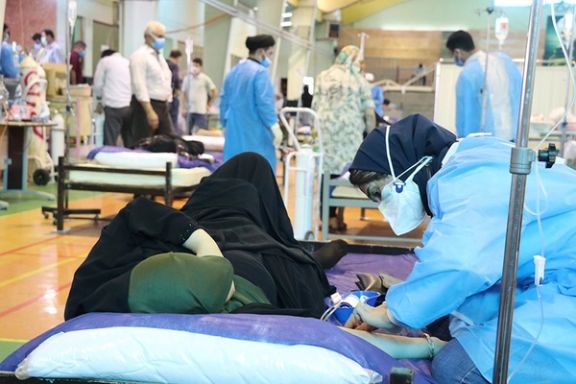
Iran will reportedly receive $90 million from the World Bank for measures to fight the Covid-19 pandemic, a spokesperson for the organization has said.
The World Bank approved the aid on December 21 because Iran is "the epicenter of Covid-19 infections in the region" and mitigating “the ongoing humanitarian crisis in the country” would reduce the contagion of the disease beyond its borders that benefits the neighbors, particularly as the Omicron variant is causing a new wave of cases.
The spokesperson told AFP that the loan "will be utilized only for procuring additional lifesaving, essential medical equipment to strengthen Iran's pandemic response", emphasizing that "This funding will not go to the Iranian budget and all loan proceeds, as well as procurement and disbursements, are being managed by the World Health Organization”.
“Distribution and installation of equipment will take place at health facilities approved by the World Bank and will be subject to independent monitoring and verification," added the spokesperson.
In May 2020, the World Bank granted Tehran $50 million via the Iran Covid-19 Emergency Response Project "on an exceptional basis" due to the pandemic.
Iran, which confirmed the first Omicron case on December 19, is the worst hit countries in the Middle East by more than 132,000 deaths since February 2020.

Families of victims who died when Iran shot down an airliner in 2020 gathered at Tehran's Imam Khomeini Airport and the crash site Saturday to demand justice.
Families who last year had gathered at the airport on the first anniversary of the tragedy that claimed the lives of all 176 onboard carried photos of their loved ones and posters that read "Compensation Can Never Replace Justice".
Iran’s government announced in December 2020 that all victims would receive the $150,000 compensation but many families have refused to take the money and insist they just want punishment for those responsible for the death of their loved ones.
"Our hearts are still bleeding after two years remembering that night …The truth must come out, it shouldn't be sacrificed to suit the expedience [of politicians]. We insist on truth and justice," the father of one of the victims is seen saying in a speech in a video posted on Twitter.
Victims' families then chanted "Truth, Justice", a slogan that also appeared on their posters.
"Why did you fire missiles at our children? Why did they kill them? Why did they hide the truth about what they had done?" another video shows him saying in his speech while insisting that victims' families wanted the truth to be revealed and those responsible for the order to fire missiles at the airliner be punished, not compensation.
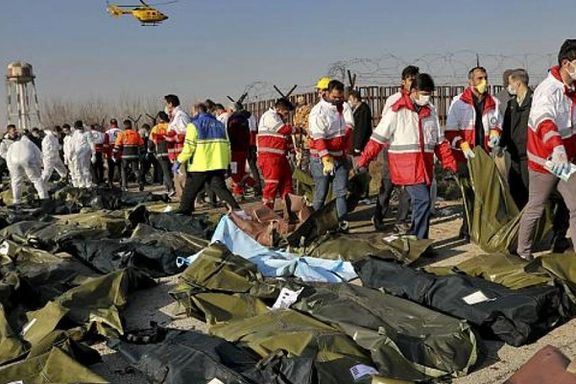
Families later went to the crash site in Shahed Shahr in the southwest of the capital where they were joined by locals who chanted "Truth, Justice" as a helicopter, apparently belonging to security forces, flew overhead.
Ukraine's flight PS752 was shot down by two air-defense missiles fired by Iran’s Revolutionary Guard (IRGC) in the morning of January 8, 2020, as it took off from Tehran’s Imam Khomeini International Airport.
Despite expecting retaliation for IRGC missiles fired at bases in Iraq hosting US troops only hours earlier and expecting a retaliation, the IRGC which is responsible for air defense of the capital did not close the civilian airspace in the early morning hours of 8 January.
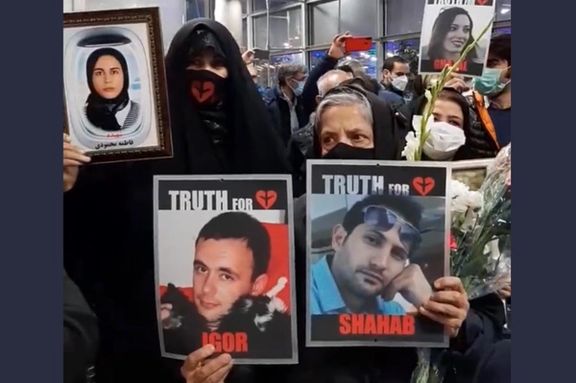
For three day the authorities claimed they knew nothing of the real cause of the crash but after an amateur video emerged on social media that showed missiles were fired at the plane, Iran had to admit the military had shot down the plane by “human error”.
Tehran has not allowed an independent investigation or provided full answers to questions by other countries, including Ukraine. The trial of ten low-ranking military personnel began in November. Many among victims' families objected to the trial demanding "the real culprits" to be held accountable.
In May 2021, an association representing the families of victims announced on social media that some families had received an electronic message from the military prosecutor handling the case informing them that high-ranking officials cannot be prosecuted.
Tens of victims were Canadian citizens or lived in Canada where their families gathered at one of the victim's home Friday evening in Toronto.
A spokesperson for Global Affairs Canada in a statement Friday called the downing of the Ukrainian airliner a "Canadian tragedy" and said they "remain committed to seeking answers and pursuing justice".
Canadian Prime Minister Justin Trudeau met virtually with the families on Friday. "Our government will not rest in our fight for justice and accountability," he tweeted after the meeting.
Meanwhile, Iran's security forces Saturday arrested a civil rights activist, Yashar Tabrizi, soon after he posted a video of himself remembering the victims at the crash site near Tehran. In the video Tabrizi, a taxi driver, said he had gone there with his family to light a remembrance candle and to demand those responsible to be put on trial.
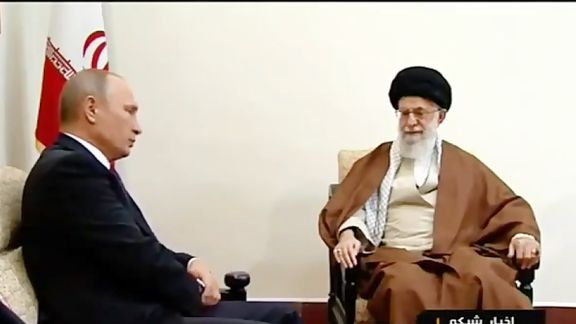
Iranian President Ebrahim Raisi’s upcoming January visit to Russia is perceived both as an opportunity and as a moment of sober calculations in Tehran.
A January 4 report the Iranian Labor News Agency ILNA said that the two countries will discuss an agreement in defense, which includes purchasing tens of military aircraft for Iran. Iranian pilots have been undergoing training to fly Sukhoi jets, ILNA reported. According to ILNA, Iran might also try to purchase the Russian S-400 air defense systems.
Russia, a participant in the Joint Comprehensive Plan of Action (JCPAO), and a key player in the current Vienna negotiations to restore the agreement is seen as the Islamic Republic’s diplomatic backer. However, some Iranian media and social media users have harshly criticized Russian envoy Mikhail Ulyanov's accentuated role in the talks saying that he has sometimes behaved in a way as if he was speaking for Iran. Others have accused him of dictating his ideas to the Iranian team.
Meanwhile, a video of Iran's chief negotiator Ali Bagheri-Kani speaking after a meeting with Russian Deputy Foreign Minister Sergei Ryabkov in Moscow has gone viral on social media. In the video, Bagheri tells Ulyanov: "We are seriously counting on you.” Also, going viral on social media is a photo showing Ulyanov in a meeting with US Special Representative for Iran Robert Malley, as if the two world powers are deciding the fate of the talks.
The Iranian opposition sees Raisi's trip as part of the Islamic Republic's determined policy to rely on Russia and China to avoid better relations with the West, to the detriment of Iran's national interests.
In a commentary on the moderate news website Rouydad24, Seyyed Mahmoud Sadri, a former Iranian ambassador to Cuba, wrote, "Raisi's visit to Moscow is a significant event, however, he should be aware that this is a complicated political move. Both sides at this meeting should try to win the other side's confidence and provide a baseline for solid relations in the future."
"What makes this visit important is Russia's geopolitical situation and its industrial and military potentials as well as its membership at the UN Security Council," Sadri said, mindless of the fact that in early 2010s Russia at times voted against Iran at the Security Council.
However, Sadri noted that Iran should also remember some bitter episodes between Tehran and Moscow including broken promises and quite a few wars in the past two centuries. However, he did not elaborate on Moscow's broken promises. But he pointed out that both under Communism and in the post-Communist period, Russia has benefitted from Iran much in the relationship. As an example, he mentioned the way Russia has benefitted from Iran's military support in Syria while it has given more concessions to Turkey and Israel.
Sadri warned that Iran's "Looking East" policy cannot serve the country's national interests without trying to reduce tensions with the West at the same time. Also, Iran should be aware that ties with the West are always important for Moscow.
Last Autumn, the Chief of Staff of the Iranian armed forces Mohammad Bagheri claimed that Iran has received advanced military equipment from Russia, but although Iran is keen to display its military capabilities, nothing in this regard has been showcased so far.
Bagheri has said, "Ties between Tehran and Moscow are strong enough, but the two sides are still far from building a military bloc."
Iran expects to get 59 Sukhoi and other military aircraft from Russia as well as overhauling its old MIG and Sukhoi jets. However, these might be more feasible than Iran's demand for the S-400 system which Russia has agreed with Israel not to sell to "untrustworthy" countries.
On the other hand, even if Iran prioritizes its military needs over improving its citizens' livelihood, it might not be able to pay for what it wishes to purchase from Russia as a result of US sanctions on its international banking.